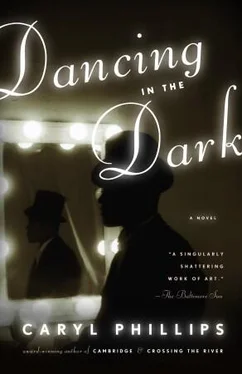Nineteen eighteen debuts as a hard year, with America still in the war, and winter icy cold, and his wife suffering from large mood swings and feeling that the bloom is permanently off her rose, and Bert choosing to hide away in his library and spend a great deal of his time staring out the window at the colored people who walk confidently up and down Seventh Avenue. Africa is in the air again, and he hears rumors of a small Jamaican man down at 125th Street who is urging colored folks to go back to Africa, where he promises them they will meet black kings and queens, and they will discover a place where they might live in peace at some remove from all the hostility of American life. He and George tackled Africa a long time ago, but does anybody remember their productions? In Dahomey? Abyssinia? He suspects not, for the musical seems no longer to be in vogue now that Bob Cole and Ernest Hogan, and George Walker himself, have long since succumbed to the “entertainer’s disease.” Once upon a time it was said that all over America the Negro was dancing himself to death, but now, during these leaner times, Bert sometimes feels as though he is the only colored man still performing in America, albeit to Mr. Florenz Ziegfeld’s audience of white people, and so in 1918 he decides to take time off, having informed Mr. Ziegfeld that he has family business to attend to. Bert spends whole days sitting in his library and letting his mind wander, thinking of purchasing a roadster, or wondering about the wisdom of an airplane excursion, only to have his reverie rudely interrupted by his wife opening or slamming doors, or shouting instructions to the housekeeper. Not wishing to complain, he invests greater periods of time in Metheney’s, where the talk is increasingly related to the question of whether the colored man should go off and fight the white man’s war, or the folly of the government at Washington, or the possibility of Jack Johnson regaining his heavyweight crown. These quiet conversations are always conducted in the spirit of Metheney’s, and although he has opinions on a wide range of subjects he finds it difficult to enter these fierce, but muted, debates. An increasingly strident Harlem is changing and, Mother aside, there is nobody to whom he might turn and air his thoughts, and so he often sits in Metheney’s and nurses his drink and wonders if he did the right thing telling Mr. Ziegfeld that he would not be taking part in the Follies of 1918 for he wished to stay home and help his wife, who was suffering from melancholia. However, it has to be admitted that since Mother has discovered the curlers and magic pomades of Madame C. J. Walker, and dispensed with her dozens of hats and bonnets, some of her despondency seems to have dissipated. The truth is, no matter how long he muses over the rights and wrongs of his decision to take time out from the Follies, he understands that he will never reach a successful conclusion, and so he resigns himself to simply sitting in Metheney’s and drinking steadily, and listening to conversations that he feels he should not participate in, led by men he finds it difficult to speak with, about subjects that he feels he knows too much about. Clyde D pours him yet another drink, and Bert occasionally lifts his head and watches America turning in one direction while he remains seated and worried that perhaps he is incapable of moving forward at either the same pace or in the same direction as his adopted country. Down in midtown the beautiful girls, and the lavish costumes, and the elaborate settings of the Follies of 1918 are being applauded by men and women who might, after the show, choose to go up and onto the roof of the New Amsterdam Theatre and join patrons such as Diamond Jim Brady, or William Randolph Hearst, and savor the late-night antics of Ziggy’s intimate rooftop Frolic. Back up in Harlem, Bert Williams is taking a break, but he has already decided that next year, if Mr. Ziegfeld will have him back, he will return to the New Amsterdam Theatre and Mr. Ziegfeld’s colored star will rejoin the Follies of 1919.
As he leaves the park bench and begins to walk slowly uptown through Central Park, he remembers that again, tonight, on his final performance with the Follies, he had difficulty seeing them through the frosted glass. He knew that should he reach up his hand and wipe the glass, his confusion would be revealed, and such a move would therefore be humiliating. He has suffered like this for the whole season, and he has survived many fraught moments when he found himself standing on the Follies’ stage and looking out at the audience without either fully seeing or hearing them. Luckily, he has had little trouble with the actual performance, which is like a broken-backed shoe into which he can easily step, but whenever he tries to focus on the audience his mind often wanders aimlessly and he discovers that he can no longer communicate. At least the patrons have not noticed, that much he is sure of, but it frustrates him that he can never predict when this affliction might strike. The Follies of 1919 has been a trial, for each evening he has walked onstage consumed with dread, and on this evening, at his farewell performance, he once again found himself staring helplessly at the glass, unsure if the audience could actually see the full terror of the man in the window who has been so unforgivably clumsy with his own life and who is peering out in their direction. Leaving tonight’s stage he felt great relief, for he understood that never again would he have to withstand this nerve-racking turmoil of uncertainty, and now, after Mr. Ziegfeld’s Circle Bar party, he is content to find himself walking alone through Central Park and in the direction of ‘35th Street and into retirement in a Harlem that, to his dismay, seems to be increasingly dominated by sporting-house keepers, but a Harlem that nevertheless feels like some kind of home.
In retirement he soon discovers that one unstructured day leads aimlessly to the next, and he rapidly falls into a stupor of illness. His wife worries at his physical and mental state, for he begins to keep strange hours, often alert and awake in the middle of the night, but during the day he dozes long and hard, and he will only pick idly at his food. Finally Lottie can take no more and she decides to call a doctor and plead with him to examine her husband. Exhaustion of mind and body is the young doctor’s analysis of the situation, and although his wife finds this prognosis unsatisfactory she pays the man and resolves to nurse her husband back to health. She thinks about writing to his aging mother in California, but she understands that her always private husband may consider this an unwelcome intrusion into his affairs, and so she quickly dismisses this thought. She also puts to one side her hope of one day inviting her three nieces to New York City, for she knows that her husband is not strong enough to endure the confusion. Mr. Ziegfeld, like the rest of the profession, hears the sad news of Bert’s post-Follies spiral into drinking and despondency, and he sends a huge bunch of mixed flowers in which roses are the dominant species. There are so many flowers that it is easy for his wife to divide them into four vases, which she places at various points in the house, leaving the largest and most impressive of the bunches in her husband’s library. The high odor permeates the whole house, but she cannot decide whether it is a good thing or not to remind her husband of Mr. Ziegfeld at precisely the time that he is trying to move beyond the Follies. However, he enjoys the scent, which lingers even after the flowers have begun to wilt, and he reads his newspaper and stares out the window and tries to obey the doctor’s orders to take rest. Viewed from the outside it appears as though the famous colored performer is assiduously following instructions, but inside himself Bert tries to still a pounding heart, and in his mind he wishes to stifle his own private knowledge that he has no plans as to what he might do next. His inability to make a decision of any kind is causing him great embarrassment, and these days when he smiles weakly at his wife, whose lips he remembers taste as sweet as cherries, she often feels like turning away and shedding tears.
Читать дальше












